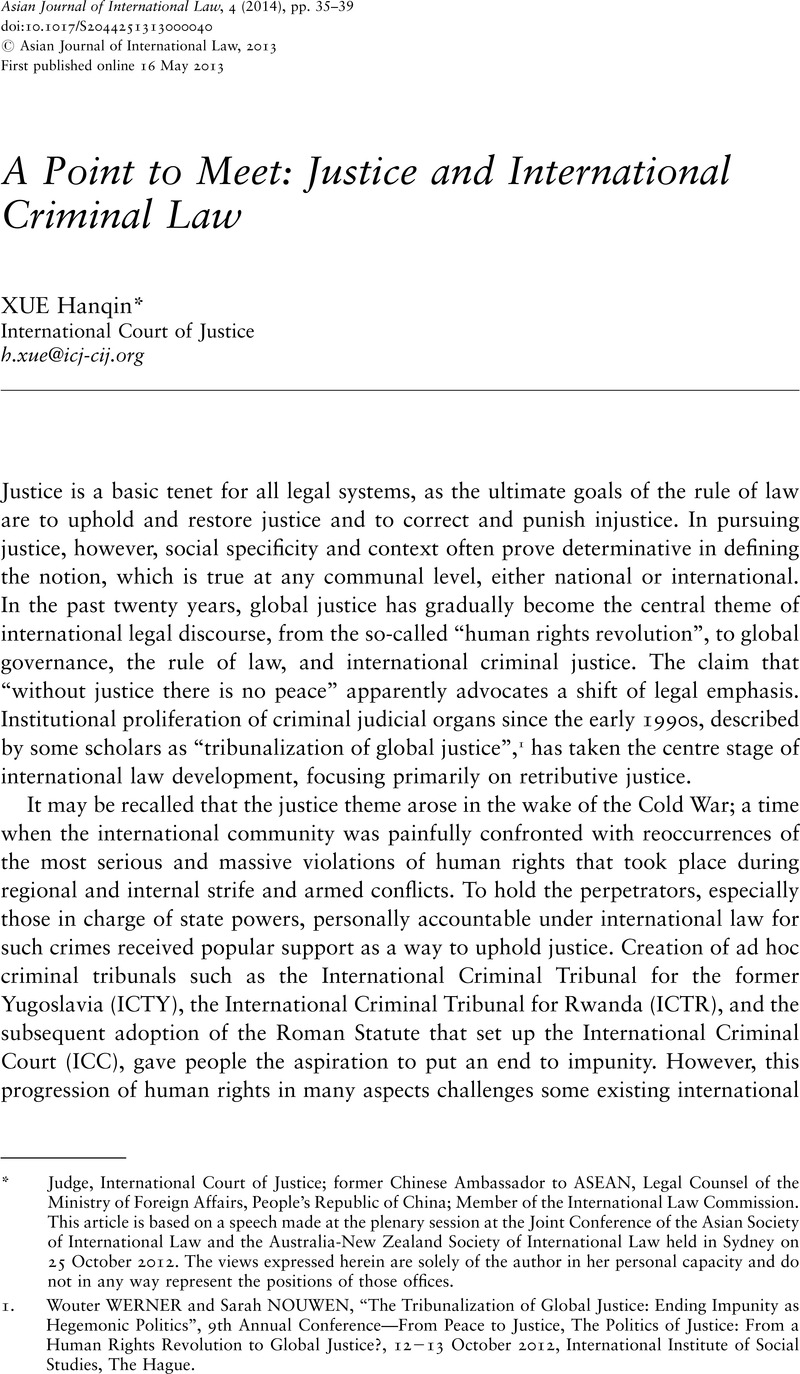No CrossRef data available.
Article contents
A Point to Meet: Justice and International Criminal Law
Published online by Cambridge University Press: 16 May 2013
Abstract

- Type
- Articles
- Information
- Copyright
- Copyright © Asian Journal of International Law 2013
Footnotes
Judge, International Court of Justice; former Chinese Ambassador to ASEAN, Legal Counsel of the Ministry of Foreign Affairs, People's Republic of China; Member of the International Law Commission. This article is based on a speech made at the plenary session at the Joint Conference of the Asian Society of International Law and the Australia-New Zealand Society of International Law held in Sydney on 25 October 2012. The views expressed herein are solely of the author in her personal capacity and do not in any way represent the positions of those offices.
References
1. Wouter WERNER and Sarah NOUWEN, “The Tribunalization of Global Justice: Ending Impunity as Hegemonic Politics”, 9th Annual Conference—From Peace to Justice, The Politics of Justice: From a Human Rights Revolution to Global Justice?, 12−13 October 2012, International Institute of Social Studies, The Hague.
2. BERGSMO, Morten and Lin, YANGeds., State Sovereignty and International Criminal Law (Beijing: Tokel Opsahl Academic Publisher, 2012)Google Scholar
3. GUTTO, Shadrack, “Peace, Security and International Justice in Africa” (2007) 2 Africa Legal Aid Quarterly, Interface between Peace and International Justice in AfricaGoogle Scholar
… the colonial phase of Africa's captivity that superseded slavery witnessed the destruction of states, kingdoms and empire; imposition of alien spiritualism and religions, systematic plunder of minerals, plant, animal and other resources using cheap labour, and imperial state sanctioned commission of serious crimes and massive and gross violations of human rights all over the continent and its islands. Perhaps, the genocide by King Leopold of Belgium that killed close to 10 million Africans in what is today the Democratic Republic of Congo between 1897 and 1910 typified the criminality of the civilizing mission of European colonialism in Africa.
4. Three cases were referred to the ICC by Uganda, the Democratic Republic of the Congo, and the Central African Republic. Two cases were referred by the Security Council: one is Darfur, Sudan; the other is Libya. Both countries are non-state parties. Two cases were taken by the Court proprio motu, in Kenya and Côte d'Ivoire.
5. UDOMBANA, Nsongurua, “National Courts and Complementarity” (2007) 2 Africa Legal Aid Quarterly, Interface between Peace and International Justice in Africa, 70 at 70Google Scholar
6. Ibid. The heads of the Lord's Resistance Army (LRA), who committed serious crimes, were indicted by the ICC on charges of war crimes and crimes against humanity. The peace talks under the auspices of the President of South Sudan were believed to be the best option yet to find a solution to the ongoing conflict. The talks were stalled due to the referral of the case to the ICC, as the LRA would advocate for amnesty or reconciliation mechanisms. Caroline ORT, “Alternative Mechanisms of Justice: The Case of Northern Uganda” (2007) 2 Africa Legal Aid Quarterly, Interface between Peace and International Justice in Africa, 61 at 61.
7. WOOD, H.L. Justice Georgina T., “National Peace and International Justice” (2007) 2 Africa Legal Aid Quarterly, Interface between Peace and International Justice in Africa, 14 at 15Google Scholar
8. Ibid.
9. United Nations Declaration of Basic Principles of Justice for Victims of Crime and Abuse of Power, GA Res. 40/34 (1985); United Nations Basic Principles and Guidelines on the Right to a Remedy and Reparation for Victims of Gross Violations of International Human Rights Law and Serious Violations of International Humanitarian Law, GA Res. 60/147 (2005). For the most recent studies on victims’ participation in the criminal proceedings in ICC, see Redress Trust, “The Participation of Victims in Proceedings before the International Criminal Court: A Review of the Practice and Consideration of Options for the Future” (October 2012), online: Redress Trust <http://www.redress.org/downloads/publications/121030participation_report.pdf>.
10. See supra note 6.
11. H.L. Justice Wood, supra note 7 at 15Google Scholar
The international community started considering seriously the antecedents of the conflicts they react to by way of providing international justice. These antecedents include geopolitical and economic interests of powerful states; weak governance systems inherited from centuries of colonial rule; and weak economies that raise the stakes over limited resources and create conflicts over these resources; and a general sense of despondency among many populations that automatically devalues the dignity of the human being.
12. AKUFO-ADDO, Hon. Nana Addo Dankwa, “Peace and International Justice: the Contribution of the African Union” (2007) 2 Africa Legal Aid Quarterly, Interface between Peace and International Justice in Africa, 16 at 17Google Scholar
13. Lulu, ZHOU, “Certain Issues in International Criminal Law”, in Bergsmo and Yang, supra note 2 at 17−40Google Scholar
14. Werner and Nouwen, supra note 1Google Scholar
15. Ibid.
16. KOSKENNIEMI, Martti, “The Politics of International Law” (1990) 1 European Journal of International Law 1 at 4CrossRefGoogle Scholar
KOSKENNIEMI, Martti, “The Politics of International Law—20 Years Later” (2009) 20 European Journal of International Law 1 at 7−19CrossRefGoogle Scholar


